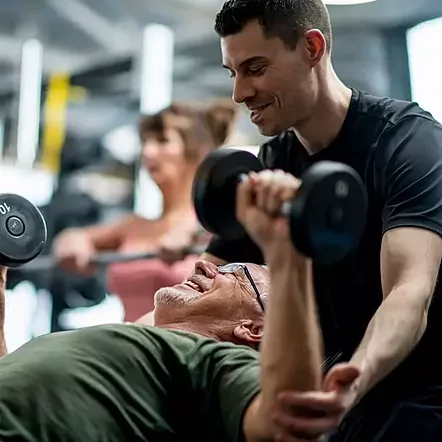Personal Training Executives and High Performance Leaders
Written by Andrew Meyer
Executive Personal Trainers in Marylebone
As executives and high-performance leaders, the demands of work can take a toll on your physical and mental health. Your busy schedules leave you with little time for self-care or exercise. However, neglecting your wellness can lead to burnout, reduced productivity, and decreased job satisfaction. Personal training is an excellent way to prioritise your health and improve your leadership skills. Let's explore the importance of personal training for executives and high-performance leaders, the key components of a personal training program, the role of high-performance leaders, success stories, and how to choose the right personal trainer.
The Importance of Personal Training for Executives
Enhancing Leadership Skills
A personal training program can help executives enhance their leadership skills. Leadership requires mental and emotional agility, and personal training can improve both. Regular exercise promotes the release of endorphins, which can lead to better decision-making, cognitive ability, and effective communication. Being physically fit and healthy makes us feel good, leading you to approach challenges with a positive attitude and greater resilience. Additionally, personal training can boost confidence and self-esteem, attributes that are essential for effective leadership.
Boosting Productivity and Performance
Personal training can boost productivity and performance for executives. Exercise has been shown to increase energy levels, focus, and concentration, which are all necessary for the job. Executives that engage in regular fitness often show greater motivation and greater levels of engagement. Personal training programs build stamina, endurance, and strength, which improve overall work performance. Moreover, research shows that regular exercise leads to creative problem-solving and more profound decision-making abilities.
Work is often stressful for executives, which can affect work-life balance. Exercise is a great tool for managing stress levels and improving work-life balance. Regular exercise regulates mood, reduces anxiety levels, and promotes better sleep quality. To be an effective leader, it is essential to prioritize self-care and take care of yourself. Personal training provides structure and accountability, making it easier to balance work and personal life.
Key Components of a Personal Training Program for Executives
Goal Setting and Assessment
Personal training programs should begin with goal setting and assessment. The first step is to identify the areas that need improvement focusing on the specific health objectives for each executive. A personal trainer will take into account your current fitness level, your medical history, and your current lifestyle to develop a custom plan. Goals should be measurable, realistic, achievable, and tied to a specific timeline.
Customised Workout Plans
Customised workout plans are a key component of personal training programs for executives. Each workout plan should be customized to individual needs, and fitness levels to guarantee optimal results in the shortest timeframe. A personal trainer will focus on strength, balance, flexibility, and cardio, pushing executives to embrace fitness and improve their health.
Nutrition and Lifestyle Coaching
Nutrition and lifestyle coaching are critical for successful personal training programs. Personal trainers are knowledgeable about healthy eating habits and can help design a nutrition plan that optimizes the efficacy of the exercise plan. Additionally, they will make suggestions about the best lifestyle choices, including tips on how to balance work and personal life and how to optimize the effects of the workout.
Accountability and Progress Tracking
Accountability and progress tracking is an essential part of personal training. Regular check-ins and progress tracking will ensure that you are meeting your goals in a reasonable timeframe. A personal trainer will keep you accountable, ensuring that you stick to your workout plan, and make necessary adjustments to achieve your objectives.
The Role of High Performance Leaders in Personal Training
Inspiring and Motivating Executives
High-performance leaders can inspire and motivate executives to adopt a personal training program. Leaders can demonstrate the benefits of exercise by leading by example, creating a supportive and motivating environment to encourage fellow executives and team members to embrace personal fitness. By sharing their success stories, leaders can motivate and inspire others to lead a healthy and active lifestyle.
Providing Expertise and Guidance
High-performance leaders can provide expertise and guidance to fellow executives through personal training. By partnering with a qualified personal trainer, leaders can provide guidance and support on the most effective ways to exercise safely and effectively. Leaders can provide helpful advice and encouragement to ensure that their team members stay on track with their fitness goals, and achieve the most significant impact.
Creating a Supportive Environment for Growth
High-performance leaders can create a supportive environment for growth that encourages personal training. They can provide support to fellow executives who are starting to engage in fitness and wellness programs, providing access to resources, tips, and advice to help them succeed. A supportive culture can encourage executives to prioritise fitness and wellness in the workplace, reducing the risk of burnout and building a sense of community.
Success Stories: Executives Who Have Benefited from Personal Training
Improved Physical and Mental Health
Personal training has helped executives lead healthier lives. By prioritizing their mental and physical health, executives have experienced increased energy and vitality, reduced stress levels, and better sleep quality. Personal training has also helped executives to reduce the risk of chronic diseases such as heart disease, diabetes while improving overall health and wellness.
Increased Confidence and Leadership Presence
Personal training has helped executives to increase their confidence and leadership presence. By feeling good and looking fit, executives exude self-confidence, making them better equipped to engage with colleagues and customers. Personal training has helped executives to feel more comfortable in their skin and improve their overall demeanor, leading to better performance and job satisfaction.
Enhanced Decision-Making and Problem-Solving Skills
Personal training has helped executives to enhance their decision-making and problem-solving skills. Regular exercise has been shown to reduce stress levels and promote mental alertness, making it easier for executives to handle complex and high-pressure situations. Personal training can also increase creativity, leading to better decision-making and problem-solving skills in the workplace.
Choosing the Right Personal Trainer for Executives
Identifying Your Goals and Needs
Before choosing a personal trainer, it's essential to identify your goals, objectives, and needs. Personal trainers should be able to create a customized plan tailored to your individual needs, including goals such as losing weight, gaining strength, or managing stress levels. By identifying your objectives, you can find a trainer with the relevant expertise and experience to guide you and achieve the desired outcomes.
Evaluating Credentials and Experience
Personal trainers should have relevant credentials and experience to provide the best support for their clients. Certification and credentials are important indicators of a trainer's knowledge, experience and dedication to their craft. Personal trainers should also have experience working with executives, high-performance leaders and other busy professionals, as well as a track record of success.
Assessing Compatibility and Communication Style
Compatibility and communication style are critical when choosing a personal trainer. You should feel comfortable and confident working with your trainer, with an open line of communication to discuss your individual needs and track your progress. A good trainer should be able to listen, understand and communicate with you effectively, empowering you to achieve your goals for maximum return on investment.
Conclusion
Personal training is a vital tool for executives and high-performance leaders seeking to improve their physical and mental health while boosting productivity, performance and leadership skills. The key components of a personal training program are goal setting and assessment, customized workout plans, nutrition and lifestyle coaching, and accountability and progress tracking. High performance leaders can play an essential role in encouraging executives to engage in personal training, providing guidance, support, and creating a culture that prioritizes wellness. By choosing the right personal trainer and following the comprehensive plan, executives can achieve their wellness objectives while improving their leadership skills and overall job performance.


